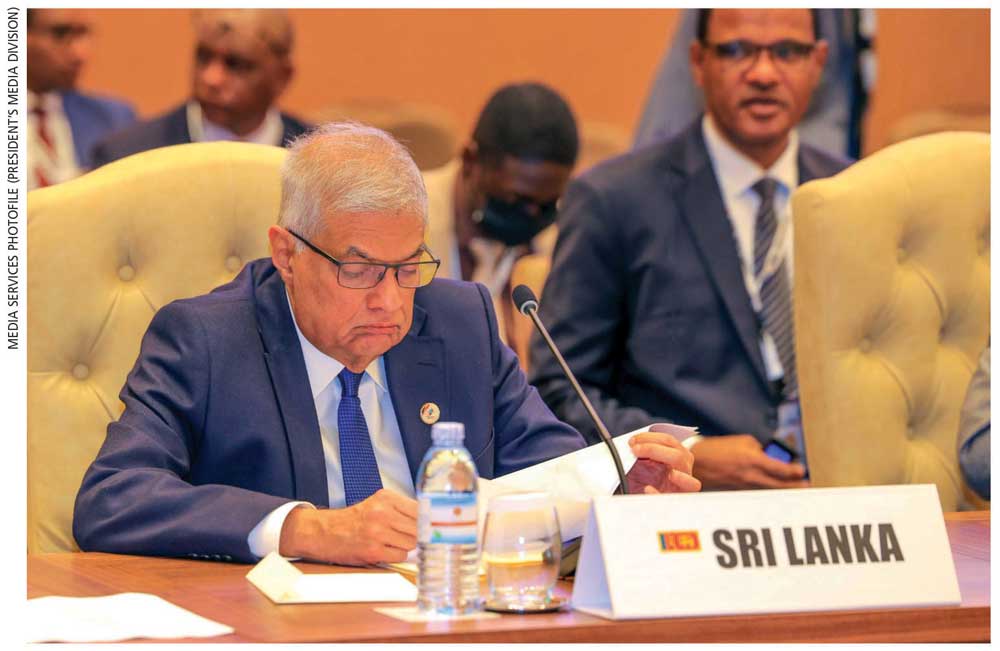POLITICAL RHETORIC VS REALITY
Tamara Rebeira traces the president’s multiple diplomatic steps in January

President Ranil Wickremesinghe underscored the widening global disparities between developing and developed nations, citing concerns over technology gaps and the proliferation of weapons of mass destruction (WMD) during his address at the 19th Non-Aligned Movement (NAM) summit in Kampala.
His remarks came amid a busy January, which included participation in the NAM summit and the 3rd South Summit of the Group of 77 and China.
These engagements followed on the heels of his 12 day visit to Switzerland, where he attended the 54th annual meeting of the World Economic Forum (WEF) in Davos.
During discussions in Switzerland, the president outlined Sri Lanka’s vision for 2024, emphasising the need for stabilisation, recovery and growth in the face of ongoing challenges.
Addressing a roundtable forum, he candidly acknowledged the adverse impact of recent crises on businesses, small enterprises and the general populace. Despite these challenges, doubts persist about the government’s ability to catalyse meaningful change and address the root causes of economic instability.
But Wickremesinghe expressed optimism, citing constructive engagements with the IMF, and highlighting Sri Lanka’s resilience and performance amid adversity. The debt restructuring process has so far met many of the IMF’s conditions, and the next step involves addressing creditors, which is reportedly underway.
Moreover, the currency has stabilised, there’s been a notable decline in inflation, many import restrictions have been lifted and foreign exchange liquidity has been somewhat restored.
Yet, while all this appears positive, the benefits of these macroeconomic indicators have yet to trickle down to the ordinary citizens.
Another significant announcement by the president outlined plans to promote growth through exports, services and investments – including foreign direct investment (FDI). The efficacy of such plans remains uncertain, as Sri Lanka grapples with systemic issues including corruption, bureaucratic inefficiencies and lack of infrastructure investment.
Meanwhile, the NAM summit held under the theme ‘Deepening Cooperation for Shared Global Affluence’ featured discussions on pressing global issues. NAM was founded in 1961 with an aim to advance the interests of developing countries in the context of cold war confrontation.
The president’s address noted the importance of unity and strength in contributing to a better world for all amid the evolving multipolar world order, and resurgence of latent and open conflicts.
Addressing the G77 + China summit in Uganda, Wickremesinghe highlighted numerous global challenges including conflicts, pandemic repercussions, climate disasters and financial market uncertainties.
And the president emphasised the disproportionate impact on vulnerable G77 economies, and stressed the urgency of reforming the global financial architecture. Achieving such lofty goals however, requires more than mere rhetoric; it demands concrete actions and a commitment from all member states.
In discussing climate finance, he underscored the inadequacy of the global financial system in fulfilling the needs of the Global South for mitigating and adapting to climate change. Despite pledges made in international forums, he emphasised the absence of tangible contributions.
While advocating for global financial reforms, the president urged the G77 + China to develop strategies aimed at helping member countries prepare for the challenges of energy transition, digital transformation, the green economy and development of a skilled workforce for the emerging global economy.
Nevertheless, questions linger over the scalability and impact of all these initiatives, particularly in the face of rooted interests and limited resources. As the G77 + China commemorate their 60th year, achieving meaningful unity and cooperation requires addressing underlying power dynamics and vested interests that often undermine collective action.
As the largest alliance of developing nations within the UN, the G77 + China have served as a platform for Global South countries to articulate and promote their shared economic interests.
However, achieving meaningful progress requires moving beyond symbolic gestures and rhetoric, to address the structural inequities and power imbalances that lead to global poverty and inequality.





